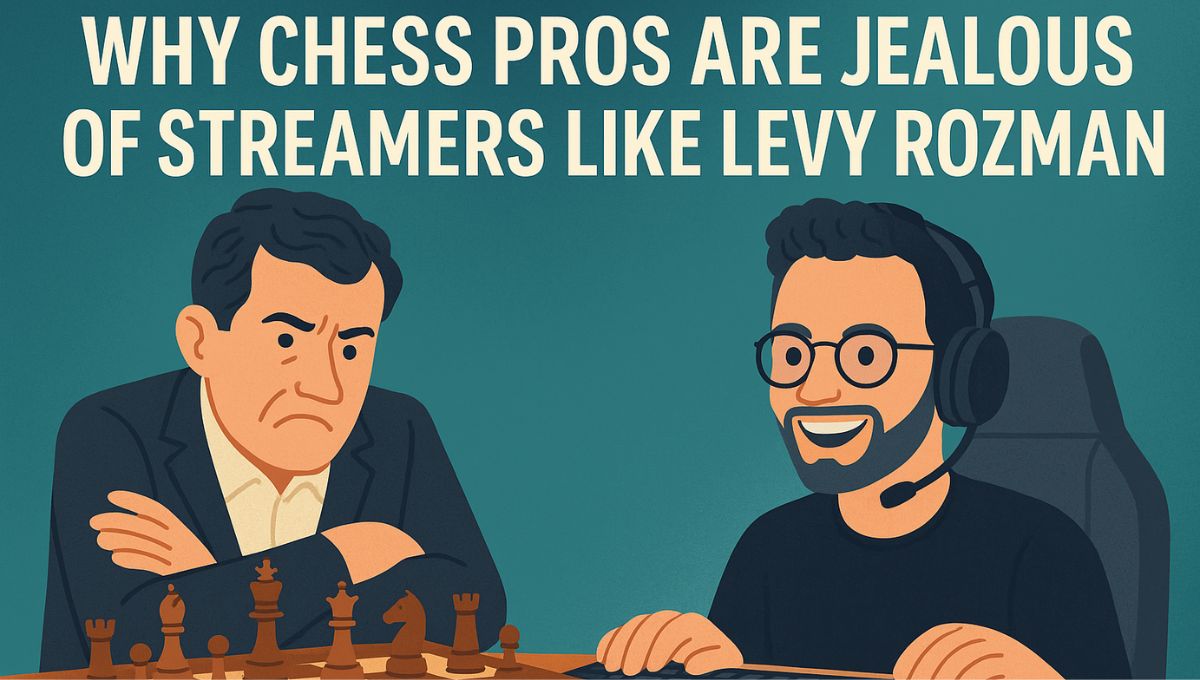Let’s be honest—chess players have a bit of a reputation. Serious, focused, incredibly smart… and yeah, sometimes a little full of themselves. It’s not hard to see why people think they might come off as arrogant or elitist.
But lately, something interesting has been happening in the chess world. While traditional players have been grinding away in tournaments, a new wave of chess streamers has taken over the spotlight. One of the biggest names? Levy Rozman, better known as GothamChess. He’s funny, down-to-earth, and insanely popular on YouTube and Twitch. And he’s making a lot more money than many titled players ever will.
So naturally, people are wondering—are some pro players feeling a little… jealous?
Let’s talk about it.
They Don’t Say It Out Loud, But You Can Feel It
Most top players are too composed to say anything outright. You’ll never hear them admit they’re jealous. Instead, they’ll drop little lines like:
- “Streaming isn’t real chess.”
- “It’s entertainment, not competition.”
- “People don’t appreciate true skill anymore.”
- “I’m not gonna reply to inferior minds”
And sure, that might just be old-school thinking—but it also kinda sounds like someone who’s lowkey bitter that they spent decades mastering a game, only to see a guy cracking jokes about 400-rated blunders rack up millions of views.
And let’s be real—Levy Rozman is very good at what he does. He’s not just winging it for clicks. He’s an international master, he’s coached, he’s worked with kids, and he knows how to teach in a way that’s actually fun. That’s not nothing.
Is It Really Arrogance, Though?
To be fair, chess is a brutal game. It demands a level of confidence most of us can’t relate to. Imagine staring at a board for hours, calculating dozens of possibilities, all while someone’s trying to outsmart you at every turn. You kind of have to believe you’re right—over and over again—or you’ll fall apart.
So yeah, some players might come off as arrogant, but maybe it’s more about being wired differently. You don’t get to the top by doubting yourself.
That said, some do act like their version of chess is the only “real” version. That’s when it crosses into gatekeeping—and that’s where the streamer-vs-pro tension really kicks in.
The New Era Is Here—And Not Everyone Loves It
In the last few years, chess has blown up online. Thanks to the pandemic, the Queen’s Gambit, and platforms like Chess.com, the game reached a whole new audience. Suddenly, people who had never touched a chessboard were watching Twitch streams, laughing at low-rated games, and learning tactics from guys like Levy and Samay.
And those streamers? They were making bank. Sponsorships, merch, coaching, YouTube ad revenue—it’s a good life.
For some traditional players, especially those grinding in obscurity, that’s a hard pill to swallow. They’ve trained their whole lives, won countless tournaments, and still struggle to get by. Meanwhile, a streamer can react to a beginner blundering a queen and earn five figures in ad revenue.
Can you blame them for feeling a little salty?
Not Everyone’s Mad, Though
To be fair, plenty of top players have embraced the online world. Hikaru Nakamura basically helped pioneer chess streaming. Others like Eric Hansen, Anish Giri, and Fabiano Caruana have jumped into content creation or joined podcast-style commentary.
A lot of them get it: this is where the audience is now. You can either complain about it—or adapt.
And let’s give credit where it’s due—Levy Rozman has done a ton to promote chess education. His content doesn’t just entertain, it helps people learn and fall in love with the game. He’s donated to schools, launched scholarships, and used his platform to spotlight important causes. That’s not something to hate on.
So… Are Chess Players Arrogant?
Some are. Some aren’t. Just like in any field, there are humble geniuses and egotistical divas. But one thing’s for sure—chess is changing, and not everyone is thrilled about it.
The rise of streamers like Levy Rozman has shaken up the old system. And while a few players might pretend they’re above it, you can sense the tension. Not because streamers aren’t good at chess—but because they’ve figured out how to turn it into something bigger. Something modern. Something profitable.
And deep down, some of those old-school pros wish they’d thought of it first.
